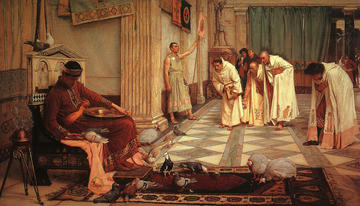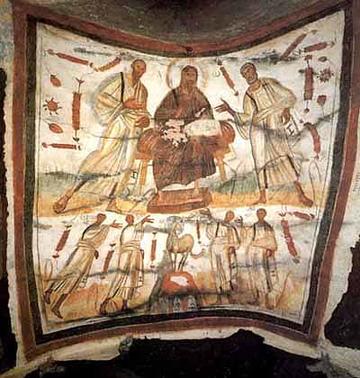The Nature of the Self in Fifth-Century Gaul
As western Roman empire delegated itself into a state of political obsolescence, the fifth-century Christian bishops of Gaul (modern-day France and Belgium) preoccupied themselves with a succession of theological disputes. The great historian of Rome’s decline and fall, Edward Gibbon (1737–94), considered such idle pontification emblematic of Christianity’s enfeebling effect on the Roman state. More recently, however, scholars have started to view Gaul’s prodigious theological, pastoral, and epistolary output as evidence of elite cultural vitality. In grand narrative terms, we might view this period as one during which the intellectual resources of antiquity were filtered and made serviceable for a new Christian age.

The Favourites of the Emperor Honorius (1883) by John William Waterhouse reflecting the nineteenth-century view of Late Antique imperial decline.
The fascinating debate concerning the nature of the soul which emerged around 470 between Faustus, bishop of Riez (d. c.490) and Mamertus Claudianus (d. c.473), a priest based in Vienne, offers an especially fine—as well as understudied—example of the way in which fifth-century theological debate provided a grammar through which to discuss issues of subjective experience. The dispute started when Faustus argued that the soul must be considered a material entity—for to say otherwise would be to place it on a par with divinity. Claudianus, an ardent Neoplatonist, penned an excoriating counter-treatise declaring it preposterous for a soul, which bears the likeness of God, to commune with the corruptible world. In this brief discussion, I shall explore the two authors’ contrasting characterisations of sensory and emotional experience.
Faustus founded his case on the premise that the soul must be spatially fixed (albeit consisting of an especially subtle form of air) and is contained within the body until it is released at the moment of death. One objection he anticipates to this argument, however, is that the soul might be said to reach beyond the bounds of the body through its mental wanderings, its affections toward certain ideas and objects, or its sensory experiences. To dismiss these doubts, Faustus compares the soul to a Roman official sitting at the centre of a bodily province: when the soul appears to reach out beyond itself, it is more accurate to say that its various attendants (that is, the senses and the affections) are interacting with the world at its behest. In other words, Faustus rendered sensory and affective activity second-order effects of the soul.

Stained glass windows from Notre Dame de l'Assomption in Riez representing Saint Faustus.
Interestingly, this framework enabled Faustus to intervene in the age-old question of whether God possesses feelings. Having distinguished the human soul so sharply from its affections, Faustus could counter the assertion that feelings such as love, anger, sadness, or regret would render divinity mutable, and hence corruptible, by suggesting that God’s affections do not result in any loss to Him. Faustus, therefore, radically severs the seat of agency (the human soul in one case, divinity in another) from the feelings which emanate from it.
Claudianus, however, rejected both Faustus’s vision of the soul as an ether contained within the body and his allowance that divinity should experience affection. Claudianus characterised the human soul as a middle being: it shares with God the qualities of immateriality and freedom from the confines of space, whilst it shares with corporeal entities a subjection to time and the capacity to degrade through sin. As for the senses, only through the invigorating effect of the soul does the body become capable of sense-perception. As such, the five senses should be understood as entities which sit halfway between body and soul, on the one hand invisible and ungraspable (like the soul) but on the other hand capable of perceiving bodily matter.
This formulation—that the senses to a degree share in the life of the soul—is especially striking given the low regard for sensory experience usually associated with Platonist and Neoplatonist thought. It is worth recalling, in this regard, that Claudianus, like all theologians of the fifth century, believed that the soul would be joined once again with the body on the Day of Judgement. Therefore, he could at best commit himself only partially to the Platonist doctrine that the soul should seek freedom from the restraints of its bodily receptacle.
Believing that the site of agency (the human soul) cannot be so easily distinguished from its activities, Claudianus takes Faustus to task for his assertion that God can possess affections with no loss to Himself: ‘affection’ (affectus) itself assumes the capacity to be affected. As such, affection cannot safely be distinguished from ‘passion’ (passio), another Latin emotion-word which possesses more direct connotations of mutability and loss of agency. As such, Claudianus’s free-floating soul entailed a more pessimistic account of emotional life, presupposing that, in humans as well as in God, feelings always carry connotations of corruption for the one doing the feeling.

Christ between St. Peter and St. Paul, a fourth century painting in the catacomb of St. Marcellinus and St. Peter on the via Labicana in Rome
In the foregoing discussion, I have offered a glimpse of the intellectual fertility which characterised fifth-century Gaul. As the institutions of the Roman Empire receded from view, Christian writers found new opportunities to explore longstanding tensions surrounding the nature of the sensitive self. It is unsurprising, then, that intellectual historians are taking a growing interest in this neglected period during which the cultural inheritance of antiquity was subject to profound re-examination.
John Merrington is an Examination Fellow at All Souls College, Oxford. His research focuses on the intellectual and cultural history of fifth-century Gaul.


